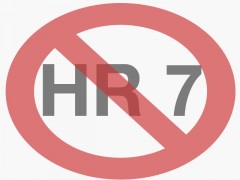
Update: today, February 9, advocacy groups are urging Americans to call their Representative and ask them to oppose HR7. For help finding your Congressmember’s phone number, click here.
Advocates and officials have reacted with alarm after seeing portions of a House surface transportation bill (HR7) that would imperil funding for public transit, pedestrian, and cycling projects. Like the Senate’s MAP-21 bill, the House version consolidates many current transportation programs into a smaller number of broad, flexible ones, but there are major differences between the bills.
Observers have objected most vehemently to the provision in the House bill that would end dedicated funding for public transportation. Currently, public transportation is funded by 2.86 cents/gallon of the federal gas tax, which is placed in the Mass Transit Account of the Highway Trust Fund. Under the bill, both public transit and the Congestion Mitigation and Air Quality (CMAQ) program would be paid for out of an “Alternative Transportation Account” funded with general taxes. Instead of being placed in a secure lockbox, as it is today, public transportation money would be subject to the unpredictable annual budget process and could be cut at any time.
The House bill would also completely eliminate Transportation Enhancements and Safe Routes to Schools, which are dedicated pedestrian/bicycle funding programs that represent just 2% of federal transportation spending but pay huge dividends in mobility and safety. It would also gut the CMAQ program, which has historically funded projects that reduce dependence on automobiles. States would be able to use CMAQ funds to widen roads for single-occupancy vehicles, a previously ineligible project category, if they argued such projects would reduce congestion.
The House’s bill contains neither the environmentally friendly freight provisions, nor the strong incentives for road and bridge repair, that exist in various pieces of the Senate’s bill.
Many groups are also angry about the bill’s proposed funding sources. It would drastically expand oil drilling in the Alaska National Wildlife Refuge and the continental shelves, which has angered environmental groups. Conservative think tanks have also assailed the bill for eroding the principle that transportation spending should be funded by dedicated fees, like the gas tax.
The T4America reform coalition officially came out against the bill on Monday. Urge your Congressmember to oppose HR7 at T4America’s website. House leadership hopes to vote on the bill by the end of next week, even as opposition continues to mount.
Meanwhile, In the Senate
Compared to the controversial House bill, the Senate’s transportation bill has encountered mostly smooth sailing and has moved forward with bipartisan support. The Senate’s Banking Committee passed the transit title of MAP-21 on a unanimous vote last Thursday. It contains a number of provisions that will boost public transit:
- It authorizes nearly $21 billion for public transit over two years, a small increase over current transit funding levels.
- It includes a $20 million transit-oriented development grant program, which would provide grants to localities that want to plan around their stations.
- It includes operating flexibility for transit agencies, allowing them to use some federal funds to avoid service cuts during economic downturns.
Senator Bob Menendez of NJ played a major role in shaping the bill as Chairman of the Subcommittee on Housing, Transportation, and Community Development.
Yesterday, the Senate’s Finance Committee identified about $10 billion in revenue sources to fully fund the bill and passed its part of the legislation. Its piece includes a provision to permanently increase the commuter tax benefit for transit riders to $240/month, which would restore parity between transit and parking benefits. This would take effect only if the surface transportation bill is signed into law.
The two Senate votes clear the way for the bill’s move to the floor of the chamber. Procedural votes could begin Thursday, with actual debate on the bill next week. Advocates will be working to ensure that key reforms — such as ensuring that local communities can access pedestrian/bicycle safety funding — make it into the bill.

[…] was to the tri-state region, these Representatives spoke out about the legislation, which would end dedicated federal transit funding and cut pedestrian safety programs. Representatives Crowley, Rangel, Nadler, and Maloney held a press conference in opposition, […]
[…] Mark Warner would expand on the TOD provisions passed out of the Senate’s Banking Committee earlier this year. MAP-21 includes a small grant program which local municipalities can apply to for assistance in […]
[…] of current transportation policy that would buy time to push for some version of their original, flawed bill. But the Senate bill was also introduced in the House this week by Congressman Tim Bishop […]
[…] Tim Bishop (D-Long Island)—Rejecting the flawed House transportation bill, Representative Bishop introduced a version of the Senate’s recently […]
[…] Some House members argued that, in addition to Keystone, parts of HR7—the House’s failed transportation bill—should be added to the […]
[…] on continued federal funding, which has been put in jeopardy by the House transportation bill that recently passed through committee. The House bill (HR7) would end dedicated funding for public transportation and create an […]
[…] can happen in conference” and that he will push for provisions that were included in HR7 — the discredited House transportation proposal that would have eliminated pedestrian and bike safety funds, […]
[…] bills that would rewrite federal transportation policy. The House’s version, HR7, would have ended dedicated federal transit funding, while the Senate bill contained several positive reforms for […]